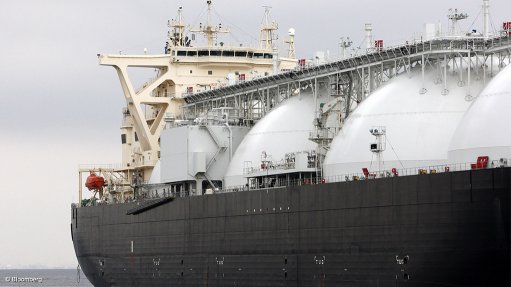
Photo by: Bloomberg
PERTH (miningweekly.com) – New research by independent researcher Grattan Institute has questioned whether the Australian government’s push for a gas-led recovery from the Covid-19 pandemic was feasible, arguing that gas would become an increasingly expensive energy source.
“The Prime Minister has talked up a gas-fired recovery for manufacturing, raising expectations of big price reductions. But the report shows that eastern Australia faces inexorably more expensive gas. If the government tries to swim against this tide by directly intervening in the market, taxpayers will pay the price via big subsidies,” the Grattan Institute said in a statement over the weekend.
“Even if the government could significantly reduce gas prices, the benefits to manufacturing are overstated. The companies that would benefit most contribute only about 0.1% of gross domestic product, and employ only a little more than 10 000 people. And much of this gas-intensive industry is in Western Australia, which has low gas prices already.”
Prime Minister Scott Morrison earlier this year announced plans for a gas-fired economic recovery, stating that the government would reset the east coast gas market and create a more competitive and transparent Australian Gas Hub by unlocking gas supply, delivering an efficient pipeline and transportation market, and empowering gas customers.
The strategy includes setting new gas supply targets with states and territories and enforcing potential use-it or lose-it requirements on gas licences, unlocking five key gas basins at a cost of A$28.3-million, avoiding supply shortfall in the gas market with new agreements with three east coast liquefied natural gas (LNG) exporters, supporting the Gas Industry Social and Environmental Research Alliance with a A$13.7-million investment, and exploring options for a prospective gas reservation scheme.
However, the Grattan Institute argued that over time, gas resources would decline, making it an increasingly expensive energy resource.
“Rather than indulging in wishful thinking or living in denial, the federal government and the gas industry, and its customers, should start planning now for a future without natural gas, or at least with a dramatically reduced role for natural gas,” the institute said.
“The government’s best role is to support the development and deployment of the low-emission alternatives that can replace natural gas in manufacturing, such as renewables-based hydrogen and renewables-based electricity.
“Nor does gas stack up as a transition fuel. As Australia’s coal-fired power stations retire over the coming decades, it would be more expensive to replace them with gas than to switch to more renewable energy such as wind and solar.
“Gas will play an important backstop role in power generation when the sun isn’t shining and the wind isn’t blowing, but this does not require large volumes of gas,” the researcher stated.